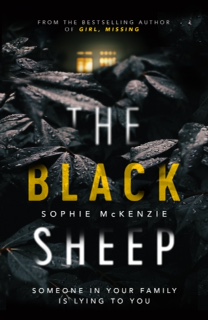Why do psychological
thrillers based around domestic settings have so much appeal?
 The Black Sheep focuses on the unsolved murder of Fran’s
husband – and her growing realization that someone within her own family may
have killed him.
The Black Sheep focuses on the unsolved murder of Fran’s
husband – and her growing realization that someone within her own family may
have killed him.
At its heart the story shares much of its DNA with my other
psychological thrillers: the setting is domestic, the dramatic conflict is
embedded within the family relationships and there is a murder at the centre of
the tale that the main character strives to solve. It’s hard to answer why
these themes recur through my thrillers, but I’m certain I’m drawn to them
because they are the story elements I regularly look for in the books I read
and the films and TV drama I watch. And it’s not just me. So many readers love
family and relationship based crime stories that such dramas even have their
own sub-genre now: domestic noir.
So
why is the domestic setting so powerful and so appealing? I think it’s a
combination of several things. For a start, domestic life is often by its
nature repetitive and humdrum. It’s rarely glamorous or exotic; nor does it
normally deal in the dramatic scenarios faced by police detectives and hospital
doctors. So when terrible crimes occur in people’s homes, it feels all the more
shocking and upsetting.
Of
course, in real life many of the darkest, saddest, most painful events we all
experience happen – or are inextricably linked to – our homes. From shocking
affairs to unexpected bereavements home life is the backdrop to heartache,
despite the fact that it’s the one place where we are supposed to feel safe. So
part of the appeal of a domestic setting arises out of that tension.
Then
there’s the specific nature of the crimes that happen within and around the
home. Established relationships reside – and implode – there. We leave and are
abandoned there. Those we love, betray
us. Those we dislike, we have to find a way to rub along with. The crimes that
happen inside the home or within our families have a special potency precisely
because family relationships are the most powerful we experience. And on that
smaller canvas, the writer has a chance to delve deep inside the psychology of
those relationships. From the mystery of a marriage between two individuals to
the complexity of the extended family network, there is a mass of material to
explore and expose.
Because
- and I’m generalizing here – women are perceived as being more interested than
men in the detail and analysis of personal relationships and because many
domestic noir readers are women, the genre is unfortunately often denigrated as
somehow less worthy than crime stories that operate on a bigger scale and deal
with corrupt multinational organisations or state-sponsored terrorism or
warfare. In this sense, domestic noir is the dark underbelly of chick lit! This
denigration is a shame. After all whatever horrors can and will happen in life
focusing on the private and individual, rather than the general and public, is
simply a way of cutting through to the personal experiences that, by
definition, readers of fiction are generally fascinated by.
Finally,
I think we’re all attracted to certain types of stories – and though these
change as we grow, there is a sense – for many people – in which they never
grow out of the fundamental themes that spoke to us in the past. Children, for
instance, often find stories that focus on a need to return to the security of
home compelling. And many adults are drawn to the same theme and look for
stories that might scare or challenge them but which conclude with a sense of
safety and resolution.
Teenagers
are particularly drawn to tales of identity and self-realisation. As adults, we
enjoy exploring these themes too. Certainly within domestic noir, many stories
revolve around the need for the main character to expose the truth about some
aspect of their family – and to adjust to the new world of relationships this
leaves them in. In The Black Sheep, the
title reflects the way several of the main characters see themselves as on the
outside of their family life, struggling to deal with their changing domestic
landscape.
Perhaps
some people also read domestic noir as a way of escaping from the safety of our
own lives and dipping a toe into a fictional world where the main characters
have it so much worse. Perhaps – and this is not contradictory - they also use
the stories they find as a mirror to their own experiences. The suffering of a
relatable central character in my book may bring up past pain from my reader’s
real life. The dance between the reader and the story is individual and
many-layered. In psychological thrillers set in domestic environments, those
layers can be both endless and skin-deep, an imagined world to lose oneself in
and a dark reflection of ones own suffering.

Simon & Schuster UK
RRP: £7.99
Released: 9th February 2017
PbkOriginal